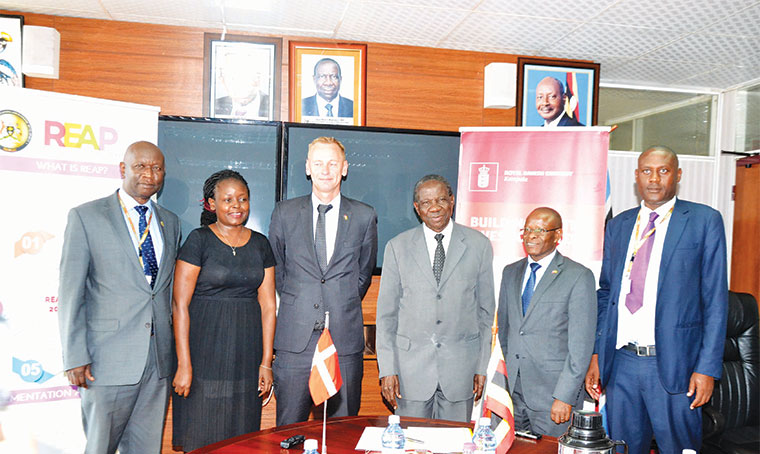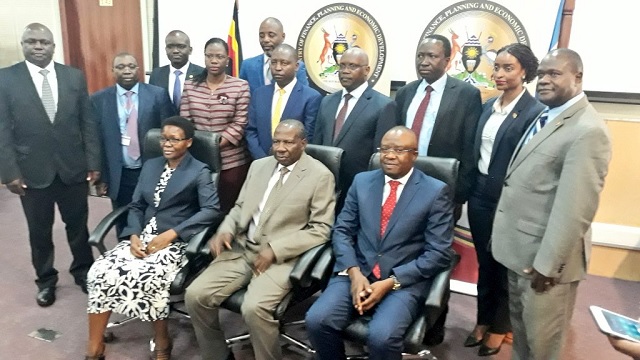The Resource Enhancement and Accountability Programme (REAP) is at the centre of implementing the Government of Uganda’s Public Financial Management (PFM) Reform Strategy July 2018-June 2023.
REAP works to strengthen Public Financial Management at all levels of government and ensure efficient, effective and accountable use of public resources as a basis for improved service delivery.
REAP works with and facilitates the Accountability Sector which is concerned with the mobilization, management and fostering accountability for the utilization of public resources to facilitate the delivery of quality and equitable services.
REAP is one of the current three projects being supported by the Public Financial Management Reforms Coordination Unit (RCU); the other two are the Uganda Intergovernmental Fiscal Transfers Programme (UgIFT) and the Global Fund to Fight AIDS, Tuberculosis and Malaria.
CLUSTER MODEL
In its operational endeavour to raise the general understanding and acceptance of the PFM reforms, the programme set up six clusters with specific strategic tasks thus:
Cluster 1: To improve resource mobilization for Uganda’s sustainable development.
Cluster 2: To enhance Policy-Based Budgeting and Planning for allocative efficiency.
Cluster 3: To strengthen public investment management (PIM) for increased development returns on public spending.
Cluster 4: To strengthen the effectiveness of Accountability Systems and Compliance in Budget execution.
Cluster 5: To improve transparency and accountability of Local Government PFM systems.
Cluster 6: To strengthen oversight and PFM governance functions for the sustainability of development outcomes.
ORIGINS OF FINANCIAL REFORMS
Since the 1980s, Uganda has been engaged in public financial management reforms. In the 1990s and 2000s, Uganda significantly improved in economic management, technical and institutional capacity through the establishment of a legal framework for budgeting, procurement and expenditure management.
The early reforms were coordinated through the Economic and Financial Management Project (EFMP I – 1993 to 1999 and EFMP II – 2000 to 2006). Consequent reforms were coordinated through the Financial Management and Accountability Programme (FINMAP I to III).
The cumulative reforms and their success in improving the efficiency and effectiveness of central and local government PFM accountability processes led to the formulation and launch of the Uganda PFM Reform Strategy 2014-2018.
The strategy aimed to consolidate the reforms and address the weaknesses. These reforms supported the Government’s goal of poverty eradication through the achievement of good governance, sustainable growth and a stable macroeconomic environment.
ACHIEVEMENTS OF REAP
Notwithstanding the disruptive effects of the Covid-19 outbreak on the planned activities of the third and fourth quarters of FY 2019/20, some achievements were registered. There was slow implementation progress across the board due to Covid-19.
The lockdown, for example, disallowed the planned domestic debt sensitization about government securities, especially mobile money bonds and the planned benchmarking at the South Africa Treasury Credit Rating Unit.
Nevertheless, REAP managed to spend 70.56 per cent of its annual budget.
Planning and Budgeting
Uganda has moved from sector-based to programme-based budgeting. During the reporting year, REAP facilitated the sensitization of the public on their right to budget information, the enhancement of budget literacy among the populace and the raising of awareness on the importance of budget transparency and accountability.
Public Investment Management (PIM)
The rollout of the Integrated Bank of Projects (IBP) system to MDAs commenced. The IBP is an online system that will act as a central repository for all public projects and will help to enable tracking development of the projects from initiation to execution and evaluation.
Processes for the development of the Public Investment Policy and Project Implementation and Evaluation Manual have started, and are expected to be concluded in FY 2020/21.
Efficient Revenue Mobilization and Prudent Tax Administration
Overall, the programme has streamlined revenue collection/tax management and cash management. In its efforts to improve domestic revenue through tax collection, administration and management, REAP in FY 2019/20 reached a compact with Uganda Revenue Authority and Kampala Capital City Authority. Through the compact, REAP boosted the two authorities with training, equipment, software and assessment/surveys.
Poverty Alleviation
The activities of REAP have significantly contributed towards the continuously dropping rates of poverty since the 1990s. REAP enhances the smooth flow of payments for services targeting the poor and also puts up strong accountability measures which ensure that resources and services reach the needy and are well accounted for.
Building Partnerships
REAP has popularized the basket funding model which facilitates joint coordination by government and PFM partners. Basket funding enables the government to redirect strategic focus at improving domestic resource mobilization, financing the fiscal deficit and reducing aid dependence.
Hence, for example, for the National Budget 2020/21, basket funding from development partners (European Union, DANIDA and KfW) made up 44 per cent of the budget. The Civil Society Budget Advocacy Group (CSBAG) contributes a lot to the PFM reform and performance dialogue.
Sustainable Debt and Development Financing
Given the rising national debt, there has arisen the need for innovative sources of development funding. In this endeavour, REAP has helped coordinate, support and oversee the formulation of the Public Financing Strategy and the Development Cooperation Policy.
It is involved in efforts to find alternative funding instruments such as Diaspora and Infrastructure bonds which are likely sources of cheaper funds for long-term development. Hence in FY 2019/20, diaspora engagements were held in Dubai, UAE, London, UK and Chicago, USA and reports were submitted to higher authorities.

Performance Assessments
With REAP support, the Office of the Prime Minister (OPM) has since 2017/18 conducted an annual performance assessment to identify key successes and challenges in service delivery. These assessments have helped track the progress made against the commitments made in the National Development Plans.
Electronic Government Procurement (e-GP) System
REAP is currently making a technical contribution to the implementation of the e-GP System. The current level of support from REAP is through maintenance of the project management office which will be critical for the actual rollout of the project.
Two systems are being concurrently designed, one with the support of the World Bank and the other by GoU. The plan is to support the rollout of the system in FY2021/22 after the pilot phase of the designs through REAP. The decision to undertake parallel pilots is to ensure that GoU selects an effective and sustainable solution contextualised for Uganda.
PFM Oversight, Coordination and Governance
The programme has facilitated the automation and rollout of financial management systems. Whereas early reforms in this area focused on increasing the independence, capacity and presence across the country of the Office of the Auditor General (OAG), REAP is now supporting ongoing capacity building for the public financial management processes of Parliament.
The OAG now has six regional Audit Offices, including the newly completed one in Arua City. A Management Information System (MIS) to cover nationwide OAG operations is undergoing implementation and is due for Go-live later this year.
REAP has boosted parliamentary oversight committees like COSASE, PAC and LGPAC, leading to the improved timely consideration of financial reports and managing the backlog of reports. REAP predecessor FINMAP provided a Parliamentary Information Management System which significantly improved the performance of oversight committees.
Payroll and Pension Management
The payroll and pension management reforms led to the Integrated Personnel and Payroll System (IPPS) which improved accuracy and speed of processing. Public servants are now paid on time, though challenges still persist regarding gratuity and pension.
The government has now enhanced the Human Capital Management System (HCM). It plans to acquire and implement HCM software and hardware in 250 sites by end of the programme.




One Response
Is funding from REAP considered as off budget or not